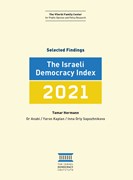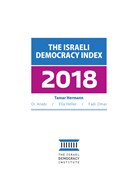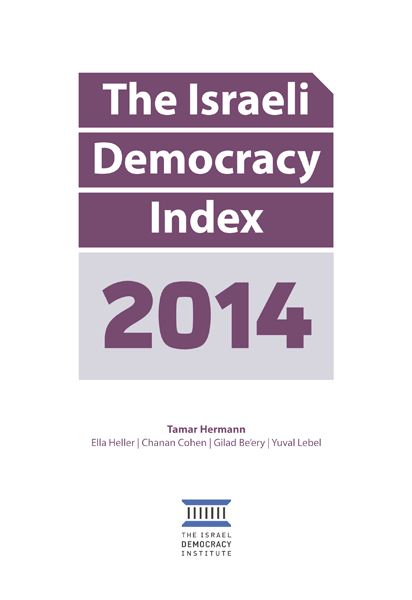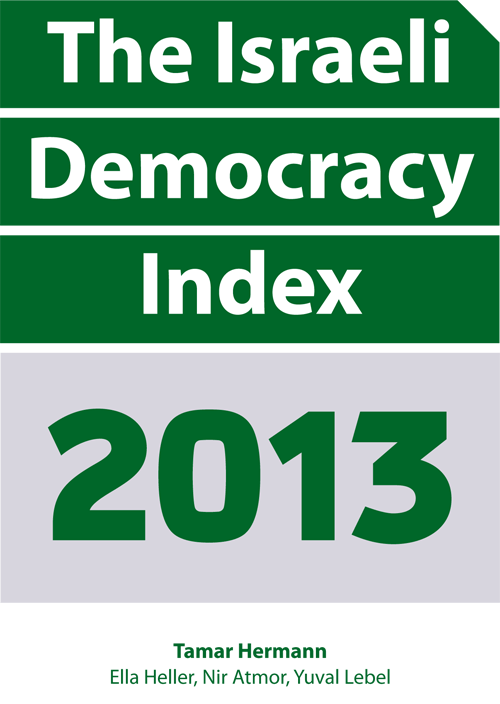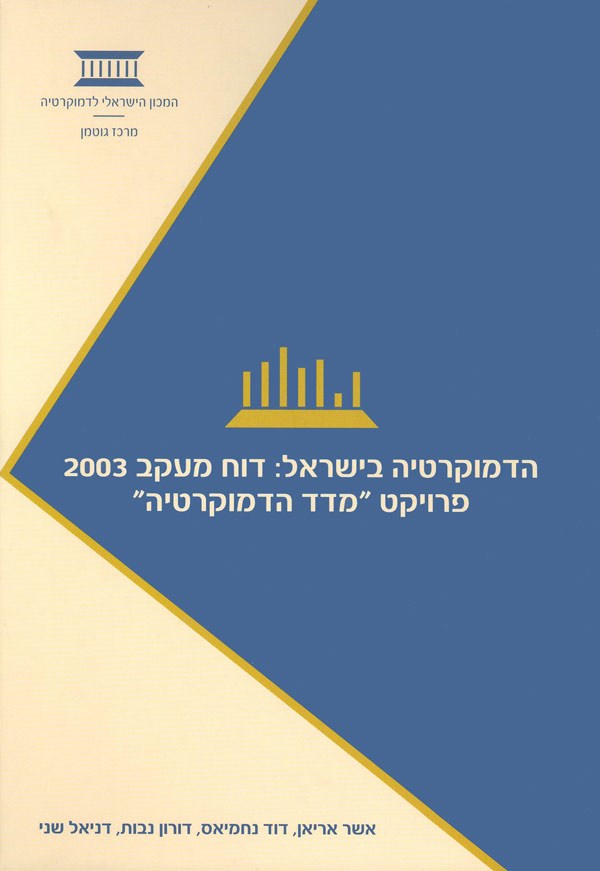

Publications Regarding Confidence in the government
Articles

The Security Cabinet Should Play a Greater Role in Determining Hostage Negotiations
Written By: Prof. Amichai Cohen, Adv. Mirit Lavi
The Prime Minister’s decision to retain the power to determine the parameters and scope of the hostage deal as a “policy issue” disregards the implications such a deal has on security issues. Israeli history underscores the importance of convening the security cabinet and upholding the appropriate democratic channels in times of war.

Most Israelis Support Deal to Release All Hostages and End the War in Gaza; Israelis Divided on How to Handle the Northern Front
Written By: Prof. Tamar Hermann, Dr. Lior Yohanani, Yaron Kaplan
Across the total sample, 56% of Israelis support a deal to release all the hostages and end the war in Gaza; 29.5% support a deal to release some hostages in exchange for a temporary ceasefire; 14.5% don't know.

Official State Commission Sends Warning Letters in Submarine Acquisition Inquiry
Written By: Dr. Amir Fuchs
The State Inquiry Commission on Naval Vessels was tasked with examining the decision-making processes at both the professional and political levels between 2009-2016 in relation to the acquisition of naval vessels during those years.
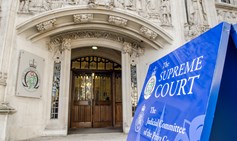
Appointment of Judges to High Courts in Democratic Countries: A Comparative Study
Written By: Prof. Amichai Cohen, Dr. Guy Lurie
The research examined 42 countries included all the OECD member states along with other leading democratic countries.

Israeli Democracy Index 2021: Trust
Written By: Prof. Tamar Hermann, Dr. Or Anabi, Yaron Kaplan, Inna Orly Sapozhnikova
IDI's 2021 Israeli Democracy Index shows a decline in trust in most state institutions
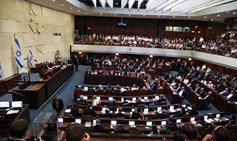
Israeli Democracy Index 2021: Democratic Values
Written By: Prof. Tamar Hermann, Dr. Or Anabi, Yaron Kaplan, Inna Orly Sapozhnikova
The 2021 Democracy Index reveals a complex picture regarding the level of public trust in key institutions and officials, 46% of respondents say that tensions between Jews and Arabs is the fiercest tension in Israeli society

Can Israel’s Politicians Regain Israelis’ Trust?
Written By: Dr. Ariel Finkelstein
Reducing centralization and handing over political power to local authorities, might just might do the trick
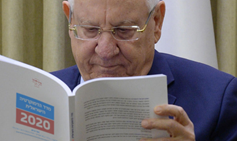
IDI's 2020 Democracy Index: Public Trust, Social Solidarity and Democracy in Danger
Israeli Democracy Index 2020 reveals the lowest point in a decade in the public's trust in all public institutions and government officials—particularly in the Knesset and the Supreme Court – as well as major erosion of the public’s sense of social solidarity.

Leaders' Credibility Low
Written By: Prof. Tamar Hermann, Dr. Or Anabi
Our monthly Index found that both Prime Minister Netanyahu and Alternate Prime Minister Benny Gantz have low or very low credibility among Israelis.
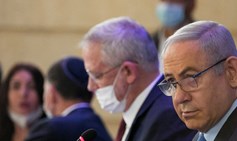
Majority Think 2nd Lockdown was Politically Motivated
Written By: Prof. Tamar Hermann, Dr. Or Anabi
55 percent of Israelis believe that the second lockdown was solely or mainly politically motivated; The majority of the public continues to express confidence in Prof. Gamzu; Continued increase in public concern about the economy
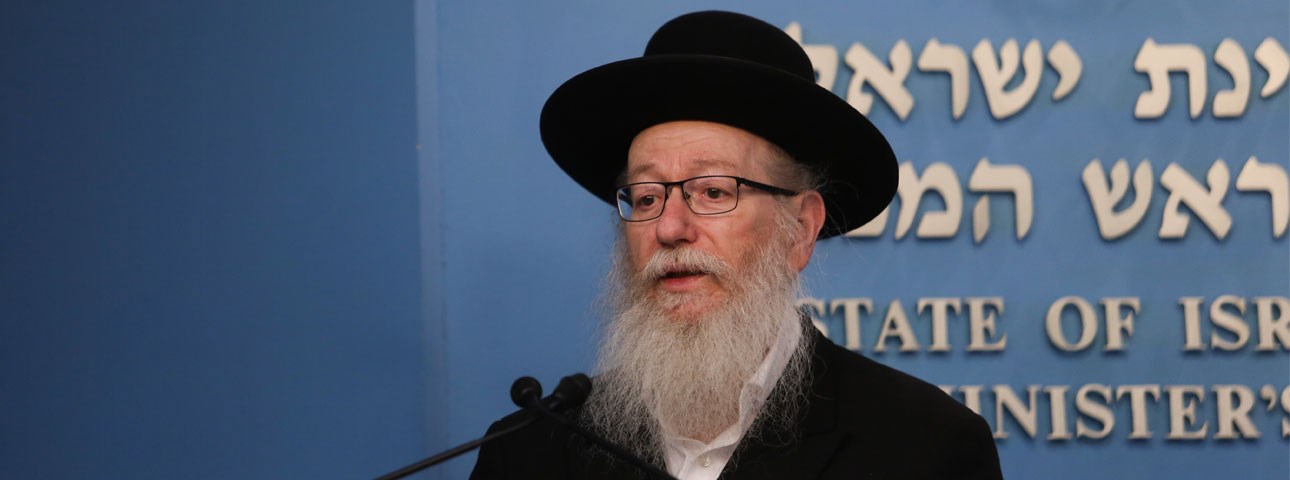
Haredim - High Level of Distrust of Government Policies
Dr. Gilad Malach, Director of IDI's Ultra-Orthodox in Israel program on MK Ya'acov Litzman's resignation from the Cabinet: "Indicative of a very strong sentiment among the ultra-Orthodox community where there is currently a high level of distrust of government policies."

Israel in Times of Corona
Written By: Prof. Tamar Hermann, Dr. Or Anabi
A special survey, the tenth in this series, by the Guttman Center for Public Opinion and Policy Research at the Israel Democracy Institute examined public opinion about government policies relating to the coronavirus outbreak and the economic fallout from the pandemic.

Without Trust, There Can Be No Compliance
Written By: Dr. Dana Blander
The Israeli public deserves leadership that isn't weighed down by a track record of incoherent instructions, selective enforcement, and politicians’ own failure to comply

PM Under Indictment - A Dangerous Precedent
Allowing Netanyahu to form a government would constitute a conflict of interest and would result in a negative and irreversible precedent for the rule of law
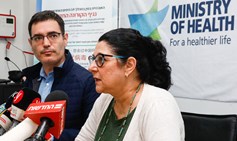
Most Israelis Trust Government Health Officials on Corona
IDI Coronavirus Survey finds that nearly half the population is pessimistic about Israel’s economic prospects

Coronavirus Special Survey
Special Coronavirus survey by the Israel Democracy Institute takes the Israeli pulse on the impact of the Coronavirus finds that 40% of Israelis feel they are experiencing high levels of stress and 65% are worried about their financial future.

Prime Minister Netanyahu - 11 Consecutive Years
Written By: Prof. Ofer Kenig

Limit the Number of Ministers and Deputies
In light of the Movement Towards a National Emergency Government: 30 Ministers Would be Excessive in Comparison to other Parliamentary Democracies; The cap on the number of ministers and their deputy minister should remain in place.

Rabbis in Politics—A Disaster for Both
Written By: Dr. Shuki Friedman
Rabbis are not necessarily any better or worse than other politicians.

It Boils Down to Netanyahu’s Conspiracy Theories
Written By: Prof. Yedidia Z. Stern
Given the dark insinuations in the PM's request for Knesset immunity, a vote in his favor would be a vote of no-confidence in the rule of law
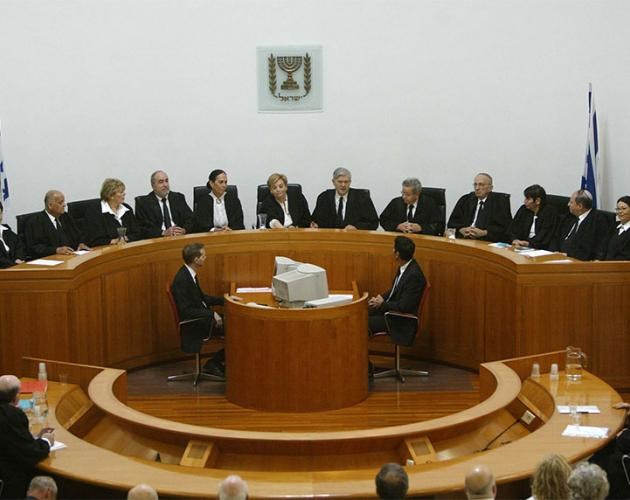
A Vote of Confidence in the Rule of Law
Written By: Prof. Yedidia Z. Stern
Regardless of the decision regardin PM Netanyahu's request for immunity - the debate will revolve around the more important question: the status of the rule of law in Israel

IDI Releases 2019 Democracy Index
Written By: Prof. Tamar Hermann, Dr. Or Anabi, Dr. William Cubbison, Ella Heller
50% of Israelis Believe that the State of the Country is 'Good'. Conversely: 58% of Israelis Believe that Their Leadership is Corrupt and 59% of Israelis Think that Supreme Court Judges’ Rulings are Politically Biased

Justice in the Courtroom, Not in the Streets
Written By: Prof. Yedidia Z. Stern
Our level-headed, intelligent, rational prime minister has lost his good judgment and is inciting against some of the most important institutions of state

Are we Headed for Another Historic First?
Written By: Prof. Ofer Kenig, Dr. Assaf Shapira
Tomorrow, Gantz's mandate to form a government will end, and we are expected to enter an unparalleled stage in Israel - 21 days, during which a majority of Knesset members, at least 61, are allowed to ask the president to assign the mandate to anyone of the 120 MKs.

Israel's Real Minority Government
Written By: Dr. Amir Fuchs
The rhetoric accompanying the attempts to delegitimize a “minority government” is questionable. The current transitional government is supported only by 55 Knesset members, with 65 opposing it. If any government deserves the moniker ‘minority government,’ it is the one currently in office.

Post-Election Scenarios and the Case for Unity
Written By: Yohanan Plesner
Of the three realistic options, a unity government seems optimal. The other possibilities - a third round of voting or a narrow, right-wing government - carry exorbitant price tags.

A Test of Reasonableness
Written By: Dr. Amir Fuchs
The bizarre constitutional situation in which we now find ourselves raises a great many legal questions, not all of which have simple answers. Does the law allow the prime minister to fire all the government’s ministers? Can he serve as “the government” by himself?
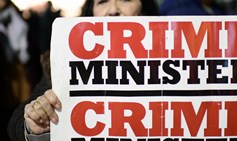
How to Eradicate Government Corruption
Written By: Adv. Edna Harel Fisher, Prof. Yuval Feldman
Among other things, government corruption deals a blow to the country’s economic vitality, and makes it less attractive to investors and entrepreneurs.

Early Elections
Written By: Yohanan Plesner
First thoughts on early elections with Yohanan Plesner - how did we get here and what to expect next

We the People: Democracy in the Age of Populism
Written By: Prof. Yuval Shany
Populism means different things to different people – and political populism has an even more sinister meaning

Wanted: A Minister of Transparency
Written By: Adv. Alona Vinograd
Government transparency means responsibility and accountability – core values that should be independent of political agenda

Strengthening the 'Rule of Law' in Coalition Agreements
The Israel Democracy Institute calls on Parties to Demand Strengthening of 'Rule of Law' and 'Separation of Power's in Coalition Agreements.

Netanyahu vs. the State of Israel?
Written By: Prof. Yedidia Z. Stern
While the final decision about an indictment will not be made until after a hearing, with the publication of the draft indictment, the Prime Minister must decide whether he will launch a public campaign under the reverse heading: “Benjamin Netanyahu vs. the State of Israel"

Parliamentary Work Index for Israel’s Political Parties
Written By: Dr. Assaf Shapira, Avital Friedman, Dr. Shahaf Zamir
A Special Analysis by the Israel Democracy Institute on which MKs make the most use of the parliamentary tools available to them.

On Political Appointments of Legal Advisers in Government Ministries
Written By: Yohanan Plesner , Prof. Yuval Shany, Prof. Yedidia Z. Stern
The Israel Democracy Institute ahead of the Knesset Constitution Committee debate on political appointments of legal advisers in government ministries: "A blow to the civil service ethos; an opening for potential corruption, forsakes public interest".

The Knesset at Age 69: Still Struggling for the Public's Trust
Written By: Lahav Harkov
While members of Knesset represent Israel's diverse society, they're still seen as self-interested and ineffectual by the public.

IDI Presents Outstanding Parliamentarian Award to MKs Elharar and Folkman
Knesset Speaker MK Yuli Edelstein: "It's time to bring the rules of the game back to the Knesset

Leviathans, Minnows and the Rule of Law
Written By: Prof. Yedidia Z. Stern
“Pray for the welfare of the government. For if it were not for fear of it, one man would swallow his fellow alive (Avot 3:3).”

Start-up Nation Central, the Israel Democracy Institute and the Israel Innovation Authority Praise the Government’s Decision to Increase Governmental Interoperability as an Important Step for the Israeli Civil Service
The Israel Democracy Institute (IDI), the Israel Innovation Institute (III) and Start-up Nation Central (SNC) said the government’s recent decision to approve implementing new and innovative interoperability strategies is an important step that could lead to a major breakthrough.

Israelis: Palestinians Must Recognize Israel as State of Jewish People
Public sees Israeli government's performance to be medium or low

The Israeli Democracy Index A Periodic Check-Up
Written By: Prof. Tamar Hermann
Each year, the Israel Democracy Institute checks the health of Israeli democracy by means of the annual Israeli Democracy Index. In an op-ed in Yedioth Ahronoth, Prof. Tamar Hermann discusses the 2013 Index, which was submitted to President Shimon Peres on October 6, 2013.

The Israeli Democracy Index: A Periodic Check-Up
Written By: Prof. Tamar Hermann
Prof. Tamar Hermann, head of IDI's Guttman Center for Surveys, discusses the findings of the 2013 Israeli Democracy Index, which was submitted to President Shimon Peres on October 6, 2013.

The Israeli Voters Have Spoken
A survey conducted in April 2011 by IDI’s Guttman Center and the Dahaf Institute on behalf of the Save Israeli Democracy NGO reveals that Israeli voters are fed up with political parties and Knesset members, but are willing to support initiatives that will change the situation.

Decade in Review: A Story of Disenchanted Lovers
Written By: Prof. Tamar Hermann
IDI Senior Fellow Professor Tamar Hermann explores developments in the relationship between the Israeli public and the political establishment, in an article that was published at the end of the third millennium as part of a collaboration between IDI and Walla!, a popular Israeli website.

Anti-Politics
Written By: Hila Zaban, Yuval Lebel, Prof. Tamar Hermann
Anti-politics is the aversion of citizens to political institutions and elected political figures. In this article, IDI Senior Fellow Prof. Tamar Hermann and IDI researchers Yuval Lebel and Hila Zaban survey different types of anti-politics, distinguish between anti-politics and de-politicization, and present insights about Israeli anti-politics based on the findings of the 2008 Israeli Democracy Index.

We expect our leaders to adhere to the highest ethical standards
Written By: Yohanan Plesner
"The facts revealed yesterday by the police are deeply troubling. Faced with this reality, all those who consider themselves leaders in our community, must come forth and make their position clear, rejecting such conduct forthrightly, lest moral decay spreads through our civil service and public’s trust in the government plummets.”

Peace Index: 40% of Israelis Believe that Rifts Between Groups Will Widen
Monthly survey also finds that 84.5% of Israeli public defines mood as good or very good while 43% expresses trust in Prime Minister Netanyahu.

A Prime Minister Under Criminal Investigation
Written By: Prof. Ofer Kenig, Dr. Guy Lurie
A summary of where the law stands regarding alleged wrong doing by the premier, as well as timely suggestions for reform, are in order.

There is Still Hope for Knesset Reform
Written By: Yohanan Plesner
When legislators exhibit such disdain for the country’s legislative body, is it any wonder the average citizen does too?
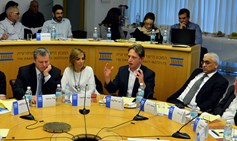
Civil Service Commissioner: For Country or Government?
Written By: Motty Shapira
The civil service commissioner holds an important public position, and should not be relegated to serving as a rubber stamp for the government.

How's It Going?
80% of Israelis are proud to be Israeli; 71% are optimistic about Israel’s future; and 38% see social gaps as a major challenge

Justice Minister Ayelet Shaked: 'Legislation is like medicine'
At joint Israel Democracy Institute-Makor Rishon conference, ministers also addressed chemical weapons tragedy in Syria.


